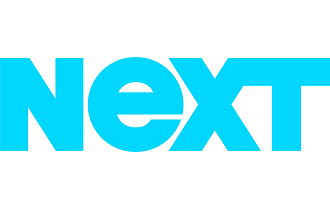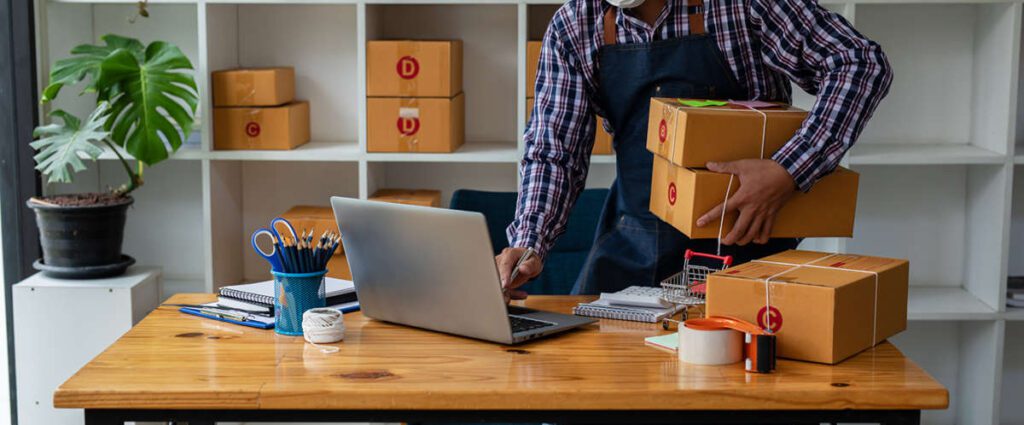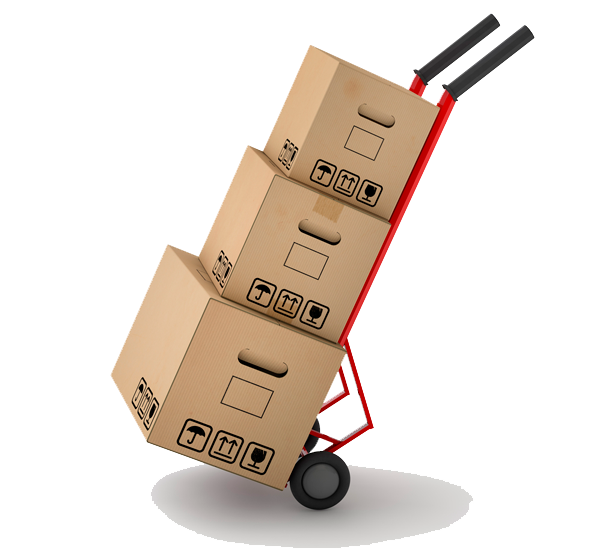E-commerce Insurance
E-commerce insurance provides financial protection against the unique risks you are exposed to as an online business owner.
Join over 150,000 businesses that have trusted us!
Save up to 35% on your insurance
Just a few minutes to get your best quote

PARTNERSHIPS WITH OVER 20 LEADING AMERICAN INSURANCE PROVIDERS





Insurance for e-commerce
As an online retailer, you have the unique opportunity to share your passion with customers around the world. From antique furniture to pet supplies, there is a niche to suit every seller’s interests.
The onset of COVID-19 undoubtedly shifted the retail landscape in a matter of months. With government-mandated closures across the country, retailers either had to open or expand their e-commerce presence to survive. Subscription services for everyday items, such as meal kits and groceries, experienced a significant increase, as did home improvement goods for those who finally found time to get around to that DIY project. However, with any business, there is a significant risk. When you are expanding into the digital space, you are encountering familiar risks (e.g., inventory theft), as well as online threats (e.g., cyber-attacks and data breaches).
At 2autoinsurance, we’re here to help. More than 100,000 entrepreneurs have trusted us to protect their businesses and cover their needs with comprehensive coverage. We’re on a mission to make insurance as accessible as possible, which is why we’ve created this guide to help you get started with e-commerce insurance.
What is e-commerce insurance?
As an online business owner, you need a policy that can withstand international shipments, customer relations, and general liabilities.
Our e-commerce insurance policy packages protect e-commerce business owners against risks associated with producing and selling merchandise online, such as cyber risks, property damage, and bodily injury.

What does it cover?
Every business is unique in itself, and insurance requirements may vary by what you sell; however, 2autoinsurance has a comprehensive e-commerce insurance package that will typically include the following coverages:
- Cyber Liability Insurance:
Since you conduct your business online, Cyber Liability Insurance is essential for retailers selling products online, especially for anyone storing customer data. 2autoinsurance covers costs associated with electronic incidents, such as a cyber hack involving your technology systems and data. For example, a worker clicks on an adversary link, accidentally delivering access to your client database and compromising their financial data. In this scenario, cyber liability insurance could cover the cost of notifying your customers and repairing your data systems, as well as any legal expenses that result from the data breach.
- Product Liability Insurance is essential for retailers as it protects against third-party property damage or bodily injury caused by products you manufacture, distribute, and sell. A customer claims the portable phone charger exploded, causing second-degree burns. Your Product Liability Insurance could cover the legal fees and medical expenditures. Different products require different levels of protection, and you must let your broker know anytime you add a new product to your shop.
Confirm that all suppliers, manufacturers, and distributors are sufficiently insured if you work for a drop-shipping corporation or are a component of a disbandment chain. Your broker can help you resolve whether or not you need to add them to your approach and if you should be included in theirs, as you can be held accountable for product liability on their end, too.
Impairments covered by product liability usually develop a fault in the creation, manufacturing, or transaction, such as an incorrect label or a lack of security alarms. If you import or export products outside of North America, check with your broker to ensure that the products meet enterprise standards.
- Commercial General Liability Insurance (CGL):
While you complete most, if not all, of your enterprise online, you may also have a brick-and-cannon location or store your products at home. Commercial General Liability Insurance, also known as slip-and-fall insurance, protects you against the day-to-day risks of interacting with third parties, such as shares of third-party bodily injury or property damage. For specimen, a customer visiting your store to pick up an order trips over the door threshold, injures their wrist and sues you for bodily harm. CGL will typically cover legal expenses and medical fees, regardless of the lawsuit’s output.
- Commercial Property Insurance:
If you hold your products in an establishment, have a brick-and-mortar store, or manage your business from a home office, it’s important to have Commercial Property Insurance. Commercial Property Insurance protects your physical location and the contents (including stock and inventory) from insured risks beyond your control, such as a fire, theft, or flood. It’s a common misconception that business-related activities at home can be covered through your homeowner policy, but the coverage is often inadequate or non-existent. Commercial Property Insurance usually includes a business interruption range(also called Business Income Coverage), which provides reimbursement for net income lost following an insured event. It may also cover overhead costs, employee paychecks, and other costs associated with temporarily shutting your enterprise. Please note; that business interruption coverage does not cover income lost due to a pandemic, infectious disease, or government-mandated closure.

Who needs it?
An e-commerce insurance policy package is critical for any online business that sells, develops, or manufactures products and sells them digitally.
We’ve covered hundreds of e-commerce store owners, including:
- Amazon Sellers
- Dropshipping Companies (eBay, Etsy)
- Subscription Companies
- E-Commerce & Retail Stores
- Shopify Business
- Wholesale Companies
- Manufacturers
How much does it cost?
Many factors can influence the cost of an insurance policy for your e-commerce stores, such as product and shipping location. For example, high-risk or expensive products, such as fireworks or luxury watches, tend to have a higher premium. For a low-risk, small business, you can anticipate a starting cost of approximately $500 annually for a basic policy.
We’ll ask some quick questions about your business during the online application that will help us determine what coverage you should have. Here are some of the main factors we take into consideration:
- Sales Volume
- Type of Products Sold
- Value of Inventory
- Number of Employees
- Claims History
You want to make sure you get the best price for your business, and we do too. That’s why we’ve partnered with over fifty insurance providers to offer you the best coverage to suit your specific business needs.
Common claims scenarios

Problem: The data system you use to store your e-commerce customer’s information is hacked, and their financial information is compromised.
Outcome: Your Cyber Liability Insurance could cover the cost to repair your data systems, as well as legal fees, totalling $300,000.

Problem: A fire destroys your home office, including your inventory, packaging materials, and work computer.
Outcome: Your Commercial Property Insurance covers the cost to replace and repair your office and its contents, while your Business Interruption Insurance covers income lost during the three months of repairs, totalling $76,000.

Problem: A client claims a pair of oven mitts you sold were defective and caused severe burns when used.
Outcome: Your client successfully sues for bodily injury. Your Product Liability Insurance covers the legal expenses and medical fees, totalling $30,000.
Frequently asked questions
Do I need to carry insurance on my stock if I am operating by dropshipping?
Confirm with your supplier if they are responsible for insuring inventory. However, it never hurts to carry this coverage in the event that you get dragged into a claims scenario. If you have multiple suppliers, it can be difficult to keep track of which suppliers have insurance and which don’t. It is highly recommended that you add Property Insurance to your insurance policy to manage your risks.
Do I need Cyber Liability Insurance if I am operating online?
It is recommended that you protect your business operations with Cyber Liability Insurance if you are selling products online as online transactions usually require an exchange of financial information over the internet. Many online retailers also store customer data to complete and ship out orders. If any third party data on your systems are stolen or damaged in a cyber attack, you may need Cyber Liability Insurance to cover the damages. Cyber attacks are becoming increasingly common. According to StatCan, one-fifth of all Canadian small businesses were targets of cyber attacks in 2017, and the number has only gone up since.
Can my online business be held liable for selling a product that caused injury to a customer, despite the product being manufactured by a different company?
Yes, it is possible that you can be held liable for products you have sold even if you did not manufacture the products. Make sure that products liability coverage is present in your insurance policy. Take a thorough look at your inventory to determine if you sell products that are highly likely to cause injuries, such as products for babies and toddlers. Whenever possible, do business with manufacturers that already carry an insurance policy.
Our most recent reviews
See for yourself what customers have to say about us.
Ready to start? Let’s get a quote!
You’ve dedicated your career to share your passion with customers all over the world. You deserve a brokerage that is passionate about finding the best coverage for your business.
Give your e-commerce business the coverage it needs to face the unexpected – get your free quote today in just 5 minutes!


